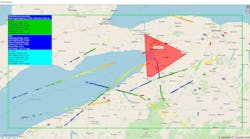By Annie Turner
In an attempt to protect itself from the threat of intercontinental attacks-primarily from Iran, Syria and North Korea-the United States has thoroughly alarmed the Russians and ensured that European nations have their own welfare, not the continent’s, at heart.
The Czech Republic and Poland are looking likely to host the U.S. antiballistic missile defense systems, underlining their status as full NATO members. The protective shield provided by the missiles is designed to protect the Eastern United States from nuclear ballistic missile attacks launched from the Middle East and North Korea. The proposed interceptor sites in Poland, near the Baltic Sea, are on a direct line drawn between northern Iran and New York and Washington.
It is expected that Poland will have 10 missile silos on its territory, but the radar tracking system that will probably to be erected in the Czech Republic is a little farther west than the ideal and there is talk emanating from The Pentagon that it would also like sites in Ukraine and Georgia.
The British-well, the Prime Minister, Tony Blair-want to be involved too, citing the special relationship with the U.S., although it’s not clear that the U.S. is as keen to use British soil as Mr. Blair appears to be.
The thinking in London is that the United Kingdom system would form part of Europe’s future protective shield and protect the British to boot. The thinking everywhere else seems to be that it would make more sense to locate the missiles in Poland and the Czech Republic. Everywhere else, that is, except Russia.
Russia has voiced its disapproval of the entire scheme, saying that it would trigger another arms race and destabilize Europe; indeed, it’s curious that the European Defence Agency is nowhere to be seen in these goings on. Currying favor with the U.S. or issuing threats against those who want to be involved in hosting the systems doesn’t bear the hallmarks of any joined-up thinking about the pan-European defense and security policy or the ability of Europeans to look pan-European defense and security set up in motion in 1999 by Italy and the United Kingdom.
Rather the situation harks back to the good old days. The Russian government, headed by President Vladimir Putin, has gone so far as to warn the Czech Republic against any involvement with the missile system. General Nikolai Solovtsov, the commander of Russia’s strategic rocket forces, said they would treat the Polish and Czech bases as legitimate targets and the head of Russia’s army, General Yuri Baluyevsky, said that Moscow might withdraw from the 1987 intermediate nuclear forces treaty-a landmark arms control pact that removed medium range missiles from Europe.
Polish Prime Minister Jaroslaw Kaczynski lost no time in reassuring the Russians that the defense shield would not pose any risk to them. No wonder. Every time someone in Europe quarrels with the Russian government, they find their gas and oil supplies turned off without any warning or discussion.
This bullying tactic-alongside the recent cold-blooded murder through polonium poisoning of former Russian spy, Alexander Litvinenko, in London, and the recentralization of power-has made other Europeans doubt that much has changed since the Soviet era. A good example of this centralization, as described in last month’s column, is that only the state export agency, Rosoboronexport, is allowed to sell armament overseas. Client nations include Iran and Syria.
Poland and the Czech Republic wouldn’t gain any direct advantage from hosting their respective parts of the defense shield, but that’s not the attraction. The two former Soviet Bloc countries see allowing Americans to locate the systems within their boundaries as the best way of preventing Russia from acting on its lingering imperialistic ambitions. Cooperation with the USA is also to show appreciation of the America’s long-standing opposition to those ambitions in the past as well as now.
Sympathies with the former Soviet regime have not disappeared in Poland and the Czech Republic. Many people are still deeply suspicious of the U.S., but investment from the U.S. and easier immigration for Czechs and Poles will help oil the wheels.
If missiles were sited in the United Kingdom, they would raise a political storm. The populace in general thinks that Prime Minister Blair is far too much in thrall to the U.S. president and there is deep disapproval of British involvement in Iraq. In addition, it is seen as (characteristically) high-handed for the Prime Minister to enter into such discussions without the involvement of Parliament.
Despite these factors, The Economist has suggested that a new missile silo could be sited at an existing U.S. military base in the United Kingdom, although not at RAF Fylingdales in Yorkshire, which already houses early warning radar equipment used in the system.
Critics of the British bid argue that the curvature of the Earth means that a site in the United Kingdom would be of no use because it couldn’t see incoming missiles to the sites in Poland or the Czech Republic from Iran, for instance.
Nor are the antiballistic weapon systems in question proven; over such distances, accuracy will always be a challenge-a small point that seems to have been overlooked in the jockeying for position.
It hasn’t been overlooked in Russia however, where the authorities are allegedly having problems with their intercontinental ballistic missile system. On March 6 an established Russian journalist, Ivan Safronov, who embarrassed the country’s military establishment, was found dead outside his flat in mysterious circumstances. The authorities suggest it was suicide; colleagues disagree. He was a colonel in Russia’s strategic nuclear missile force until 1997.
According to a report in United Kingdom’s The Guardian newspaper, “Last December he revealed that the experimental Bulava intercontinental ballistic missile, hailed by President Vladimir Putin as the basis for Russia’s future nuclear might, did not work. It had failed to launch for the third consecutive time, he wrote. His exclusive infuriated military commanders, who continue to deny problems with the missile.”
It looks like for the foreseeable future, the technology will lag behind the politics.


